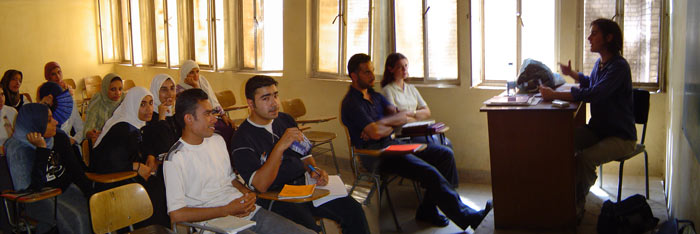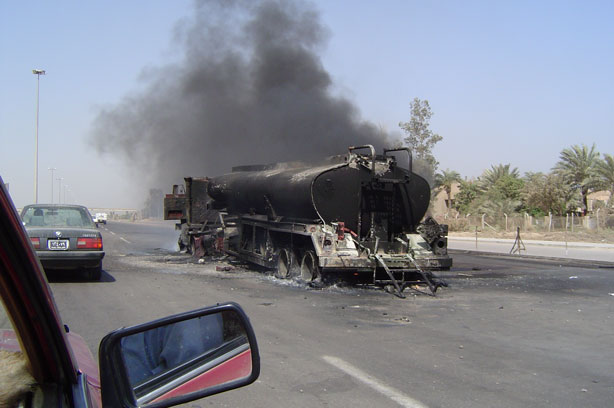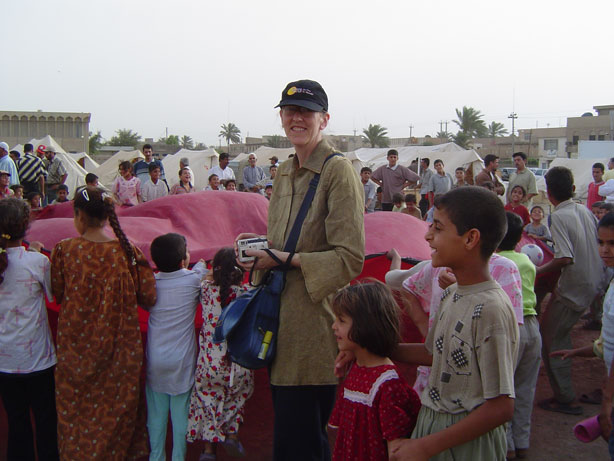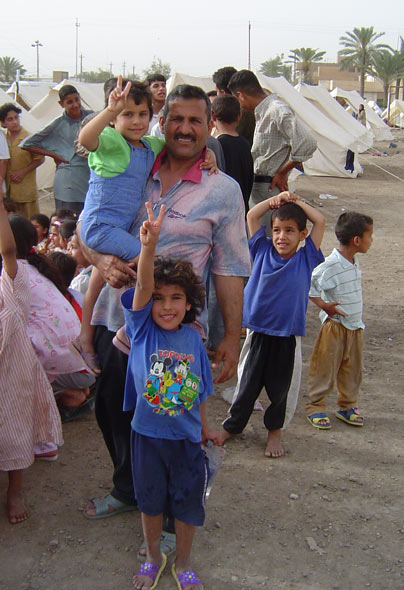Catching up on some old posts ... May 13th through May 16th
May 13th
Today I went to visit the National Association on the Iraqi Environment. I thought I was simply interviewing a member of the group, but upon arrival, I found that there was a two hour workshop on the Environment in Iraq about to start and I was the opening speaker. I stammered through a short introduction and gave them some background on my interest in environmental issues and my plan to boat down the Tigris River in Baghdad and look at some of the problems of the river. Afterwards, several speakers came forward to address the host of environmental disasters that the Iraqi people have inherited from decades of war and sanctions. The Minister of the Environment though invited, never came but sent a few representatives from his P.R. department. They were quickly at the center of a storm of indignation as many members of the audience rose to take the Ministry to task for not doing enough. One man passed me a note that said (in Arabic) that the Ministry of Environment was useless and should be dissolved.
At one point I received a question from a man in the audience. He welcomed me and asked, "What can the Americans do to help the Iraqi Environment?"
"I think," I began, "that Americans and many western countries need to take some responsibility for the role that they played in harming the environment of Iraq because of wars and sanctions. But if Iraqis are hoping that America will freely provide the help that is needed, I am afraid they will be waiting a very long time."
"Iraqis need to speak up and demand that the West take responsibility for the mess it has created," I continued, "And although I have met many Iraqis who are courageous enough to speak out, I have also found many who are unwilling to speak or even tell me their name for fear of losing their jobs or making the Americans angry."
"But in the end," I concluded, "It will only be when Iraqis, from Ministry workers down to ordinary citizens, are willing to speak clearly and honestly about their problems, that they will actually be able to solve them."
After the meeting, we went over to the River Police Headquarters near Al Adamiyia and the Abu Hanifa mosque. We had heard that in March of 2003 a police boat went out with two officers and four staff (3 men and 1 woman) from the Ministry of Environment’s Baghdad Environmental Office. During the course of their survey, they passed by the Qasr Al Adamiyia – a former presidential palace turned U.S. Military base. They were doing a survey of the river and measuring various chemical and physical properties of the water to locate pollution sources and hotspots. After they had just past the base on their return trip they stopped mid-river to document their work by taking some pictures. Shots were fired by personnel working at the base (no one was injured) and the team was taken into custody … the men were hooded with black plastic bags and their hands were bound behind them. The one woman in the group was separated from her colleagues and all were questioned. The whole ordeal took a little over 2 hours to sort out before the Americans questioning them finally believe their stories and released them … minus their camera film with three day’s worth of survey information on it, despite the offer to have the CPA develop the film for verification. In a letter from the Ministry to the CPA reporting the incident, they asked that the ministry’s environmental survey teams be given special I.D’s in order to execute their duties without
"collision with the CPA." They also asked for a formal apology to be forwarded to the Ministry as this incident
"had a very negative effect on the survey team whose only concern is to fulfill their duties and serve their country." To date, the Ministry has received no response.
On another note:
Tonight, A came to visit me in my dorm room. She told me that a few days before when she was leaving my dorm room a girl had approached her.
"Is that American woman a soldier?" the girl asked her.
"No," A replied, "she’s a teacher."
"I heard that Muqtada Al Sadr has a reward out," the girl continued, "One kilo of gold for the kidnapping of a female American soldier."
"Yes, this is true," said A, "But the reward is not a kilo of gold. It’s 200,000 Iraqi Dinars (about $150 US)."
"Oh," the girl said, laughing, "That’s not really worth it."
Thank goodness that Sadr doesn’t have a lot of pocket change and I had the good sense to stay out of the army.
May 14th, 2003
Spent the morning looking for a representative from the Iraqi Association on the Environment and Child at Mutanabi street (Booksellers’ Row … a great place to buy books in Baghdad with a nice café at the end … if you want to brave it as a woman alone). The man never showed up so we went and took a ride on the river boats. Very nice. Got loads of pictures of trash. The boat men were cool and showed us around … problem is that they can offer only two options for our Tigris River Boat Project. The small boats that zip across the river and a huge barge (which would take at least 11 hours to haul down the river … but boy, we could really party on that thing!).
May 15th, 2003
Test today. The first series sucked … I had to kick all the students out of the classroom because they couldn’t keep quiet when each group came up to do their presentations … “group” is a rather euphemistic term … since the groups splintered apart into bit-size pieces of two or three people half the time. Most of the students didn’t take the full 5 minutes and so I had to judge them on the simple performance of the line, “Yes, I’m sad about the situation in Iraq,” which was more often rendered as, “Yes, I sad about situation here … yanni … in Iraq.” Ah well, such are the trials and tribulations of an English Conversation teacher in a foreign land.
May 16th
More tests today, which quickly degenerated to a point at which I had to reschedule the second set of tests for tomorrow. ~sigh~ Later I did have a productive meeting with the National Association for Protection of the Environment and Child about the Boat Project. They are willing to handle getting the boats and inform the various Sheikh's, Imams, and Municipalities along the river. My job is to work on the CPA to get the permissions (and hence promises that they won't shoot at us as we float by). This may be a tall order but I have to try. I asked the representatives from the group where they thought the greatest problems would come from. Where they worried about terrorists? Mujahedin? No, their biggest worry was about what the Americans would do.
Lastly a few pictures ...
 Jo Wilding's guest lecture on Human Rights to Iraqi University Students.
Jo Wilding's guest lecture on Human Rights to Iraqi University Students.
 Trash at a Tigris River boat landing
Trash at a Tigris River boat landing
 Iraqi River boats
Iraqi River boats
 Derelict Dredge
Derelict Dredge








